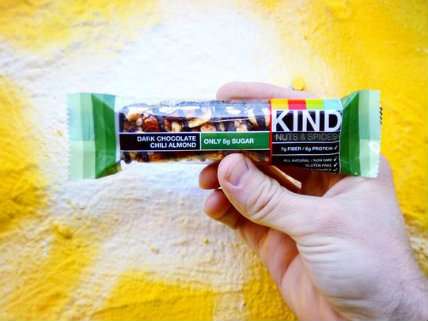KIND Fruit and Nut Bars Get FDA Linguistics Lesson: Words Only Mean What Bureaucrats Say They Mean
FDA dings KIND for using the word "healthy" since bars contain more than 1 gram of saturated fat.

The insanely flawed perspective and priorities of the U.S. Food and Drug Administration (FDA) are once again on display, as the agency targets the makers of fibrous fruit-and-nut bars. The bars, from Kind LLC, are a decent source of protein, vitamins, and good fats, without an excessive amount of processing or a slew of artificial ingredients. But according to the FDA, Kind cannot call its bars "healthy" because they contain more than 1 gram of saturated fat.
The logic here is maddening. A bar of sugar cubes held together with agave nectar would be fat free, but that hardly makes it healthy. Conversely, the simple presence of saturated fat alone doesn't make something unhealthy. "Saturated fat" is actually an umbrella category for more than two dozen different saturated fatty acids, some of which are more nutritious than others. The saturated fat butyrate, for instance—found in fermented foods and beverages and butter—may suppress inflammation in the gut and increase insulin sensitivity (that's a good thing). Lauric acid, a type of saturated fat found in milk (cow, goat, human) and coconut oil, is stellar at increasing levels of good cholesterol in the blood. Palmitic acid, however—found in much meat and dairy, as well as vegetable oils such as palm—tends to be linked to mostly negative health effects.
Sometimes, whether a particular fat is good or bad can depend on the other nutrients with it. Whether because or in spite of their high fat content, foods such as dark chocolate and almonds have been shown in study after study to have health protective properties, perhaps because they're also high in antioxidants and plant sterols. Which brings up another important matter when evaluating whether foods are "healthy": nutrients don't exist in a vacuum. They work together and can actually radically alter one another's function or effect.
Because KIND bars contain a lot of nuts, they're relatively high in fat, both saturated and unsaturated. Some varieties have up to 5 grams of saturated fat and 13 grams of fat total. Each Kind bar also contains around 2-3 grams of fiber, 3-7 grams of protein, 5-14 grams of sugar, and not insubstantial levels of various vitamins and minerals. They're not apples, but they're better than Kit Kats, and better than a lot of snacks you can grab on the go.
In a March 17 warning letter to Kind CEO Daniel Lubetzy, the FDA said KIND bars were in violation of the Federal Food, Drug, and Cosmetic Act. The FDA specifically objected to Kind's use of the word healthy in marketing copy such as "all of our snacks are pretty much the nirvana of healthful tastiness" and "KIND Peanut Butter Dark Chocolate + Protein is a healthy and satisfying blend" of peanuts and dark chocolate. This is because the Kind bars the FDA looked at contained between 2.5 and 5 grams of saturated fat per serving. Per the Food, Drug, and Cosmetic Act, only foods with less than 1 gram of saturated fat can be legally described as "healthy" on product labels or marketing.
"None of your products listed above meet the requirements for use of the nutrient content claim 'healthy,'" the FDA warned the company. Furthermore,
Your Kind Peanut Butter Dark Chocolate + Protein and Kind Dark Chocolate Cherry Cashew + Antioxidants product labels bear the term "+" (plus) as part of the product name but the products do not comply with the requirements governing the use of this term.
A plus sign can apparently only be used on product labels if it references the percentage of a nutrient relative to the government's recommended daily intake.
The FDA also faulted Kind for using the phrase "good source of fiber," which can only be used if the packaging also states "in immediate proximity" that the food is not low in total fat. And apparently voluntarily disclosing GMO status is a no-no: "non GMO glucose" is not an approved way to list the ingredient "glucose syrup" under federal code.
Kind told Quartz that "there is an overwhelming body of scientific evidence supporting that nuts are wholesome and nutritious. This is similar to other foods that do not meet the standard for use of the term healthy, but are generally considered to be good for you like avocados, salmon and eggs." But in a statement, Kind said that it is "moving quickly" to comply to the FDA's requests.
Some members of Congress have been championing the creation of a new federal agency to oversee food safety, arguing that the FDA is overburdened and hence an uptick in "food fraud" (serious mislabeling of products, which tends to be common with things like honey, spices, and olive oil) and bacterial outbreaks. But if the FDA is overburdened, it's because it's become so mired in its own bureaucratic minutiae that it can't see straight. Perhaps the agency would have more time for addressing serious food fraud and safety issues if it spent less time regulating things like the use of plus signs on granola bars, how breweries package spent grains, the words cough drop makers can use in their tweets, and the porosity of cheese boards


Show Comments (66)